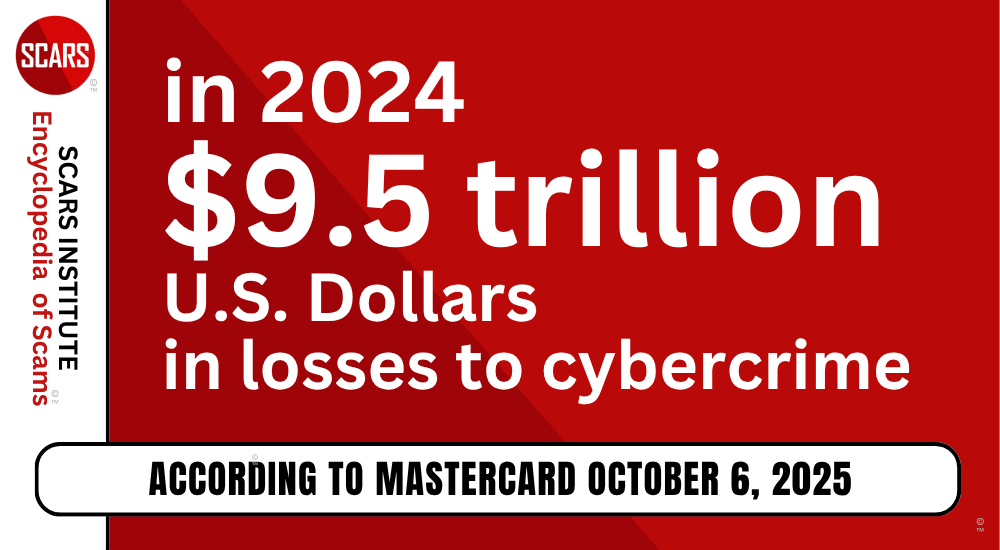
SCARS Institute’s Encyclopedia of Scams™ Published Continuously for 25 Years

The Situation Is Completely Out Of Control
You Are Being Left On Your Own To Try And Stop It!
Your consumer data is valuable to scammers and cybercriminals.
Everyone just assumes that scammers and cybercriminals are just a bunch of dumb guys sitting on a floor someplace in Africa. Nothing could be further from the terrible truth. They have vast amounts of money, and with money anything can be bought – including YOU!
As Heard At The FTC
Today (September 8th, 2022) in testimony before the U.S. Federal Trade Commission, several individuals talked about how cybercriminals are buying sophisticated data generated by Big Tech companies to support and enhance their advertising revenue. They do this by selling your data to data brokers – supposedly for legitimate marketing purposes – as horrible as that is, it gets worse, because there are data brokers selling this same data to cybercriminals too.
In fact, Google, Facebook/Meta, and the others also allow criminals to use their data directly on their platforms to place lure advertisements to pull in victims too!
The uncontrolled access to your behaviors, likes, interests, and so much more has increased the level of vulnerability to such a level that every adult and child is at risk of being uniquely targeted by scammers and criminals. Yet the big tech companies do not care, your data is money for them, and consumers have no real idea how bad the situation has become while they were not paying attention.
What Is To Be Done?
Better late than never. Even though your data can never be put back in the can, if we can stop the bleeding it will lose its value over time. But if we do not stop it now, it will only get worse since the amount of data that companies have about us is only growing,
For this reason, the U.S. Federal Trade Commission is launching a new rule-making process to establish new regulations. SCARS is an active participant in that process.
What Is Happening Out There?
Scammers would love to discover where you shop online, what Facebook pages you like, and how much you spend on your home. That’s why data brokers are in business. They are the back-ally pimps that sell your data to anyone that asks.
Yes, they are selling you!
You don’t even know it is happening and you can’t stop it, only the government can.
What Are Data Brokers?
Data brokers are companies that collect information about you and then sell that data to others, usually companies or individuals. The information that data brokers collect can be extensive, everything from your birthdate and addresses to your job title, number of children, and even your outside interests.
In most cases, you might not even be aware that these data brokers are grabbing and collecting your personal information. They have more information about you than the CIA does! And yes they also sell it to Russia and China!
Data brokers either collect information on individuals or purchase it from other companies (such as Google and Facebook). There’s a reason these companies exist: The business of selling data is a lucrative one. According to WebFX, there were more than 4,000 data brokerage companies operating across the globe in 2019 alone. Since the pandemic, it is believed to have increased 3x,
WebFX gives an example of how active these companies can be: The data brokerage Acxiom, which ranks as one of the largest in the industry, collects data on 500 million consumers in the United States and Canada. It collects up to 1,500 different pieces of information per person. According to WebFX, data broker companies made $150 billion in revenue per year.
What Types Of Information Do Data Brokers Collect?
Think of anything a company would want to know about you to help sell your products or services. This is the kind of information data brokers collect on you.
SOME EXAMPLES?
Data brokers might know how many children you have and their ages. They might know when you got married or, if things went bad when you filed for divorce. Your income, gender, and home address are all pieces of information that data brokers collect.
BUT THAT’S JUST THE BEGINNING.
Say you spend a lot of time playing online video games. Data brokers might compile your favorite games or your favorite category of games, and then sell that information to companies hoping to sell you their own video adventures. If you collect baseball cards, a data brokerage firm will want to know. If you prefer one brand of dishwashing detergent over others, data brokers might know this, too, and will be happy to let companies know.
But it goes far beyond just this, and just imagine how much more effective scammers can be if they knew all of this in advance.
How Do Data Brokers Get Your Information?
You will be surprised at how much of your personal information is freely available to the companies that want it. Data broker companies don’t need to work hard to find your data. It is bought and sold in marketplaces that scammers have access to as well.
If scammers want to target recent widows, whose spouse or partner died in the last 6 months, that have home values above $100,000, and retirement and securities accounts, they can do it easily.
They can find elderly people looking for information about dementia or assisted living – because they will be easy targets, they can do it in just a few minutes.
Data brokers collect much of their information from public records. This includes court records, motor vehicle records, Census data, birth certificates, marriage licenses, voter registration information, bankruptcy records, and divorce records. And this is the worst part – your own local governments are working against you under the obsolete idea of transparency.
Brokers also either collect or purchase data from credit card providers and retailers. This includes such information as the amount of money you owe on your department store credit card, the type of coupons you tend to use, and the items you’ve purchased in the past after swiping a store’s loyalty card. Just imagine what scammers can do with that!
If you spend a lot of time on social media or in the online world, you’re giving data brokers even more information about you. Data brokers might nab personal information from the posts you’ve made or ‘liked’ online, online quizzes you’ve taken, online sweepstakes you’ve entered, and the websites you’ve visited. This allows the cybercriminals to create new socially engineered lures and traps to suck in victims in ever larger quantities!
How Is Your Information Used?
Selling your information hasn’t proved too difficult for data brokers. That’s because these companies have plenty of potential customers eager to purchase your information. The buyers include the Russians and Chinese eager to disrupt elections and exploit access to intellectual property. It also includes scammers (pretending to be legitimate businesses – but who really cares) to get your vulnerabilities that they can target and exploit.
Some of these buyers will use your information to create online ads that are targeted specifically at you. Others will use it to determine how likely it is that you’ll default on a personal loan so they can target you for a fake lottery. Still, others might use it to determine how likely it is that you will file an insurance claim or get into an auto accident, and try to sell you a fake extended warranty or push another scam.
Marketing And Advertising
Have you ever been browsing the web only to see a banner ad for a product you already buy? Often, that ad for laundry pods pops up when your current supply is almost depleted. Data brokers might be behind this.
Guess, what? Scammers buy ads to pull you into their many different kinds of scams, and they do it to your children too!
Businesses purchase your shopping and spending information. Data brokers can often tell them what brand of laundry soap you’ve bought in the past and when you purchased it. This allows companies to send ads timed to when you might need pods. But scammers also collect data and they have learned what patterns and demographics yield the highest amounts of money for them too.
It’s not surprising, then, that scammers make up some of the active customers of data brokers.
Fraud Detection
Some businesses aren’t after your information purely for advertising or marketing purposes. Some use it for fraud detection. But scammers can also use it to target fraud.
Maybe you applied for an auto loan. Your lender might check the information you provided on your application against the numbers that data brokers dig up on you. This can help lenders determine that the information you provided regarding income, debts, and salary isn’t fraudulent.
But fraudsters can also use that information more effectively to impersonate you too!
People-Search Sites
People-search sites allow you to enter the name of any person and — usually for a fee — receive their phone numbers, addresses, age, birthdate, former addresses, and other information. Many data brokers gather this information from public records and sell it to these sites.
Many scam victims pay for these services to help them determine if someone is a fake. But have you considered that scammers now have the ability to upload their fake identities into these applications as well? They have the money to reinforce their fake identities and make them look real.
Plus everything that is available to you is also available to them – ABOUT YOU!
Is Data Brokering Legal?
Data brokers aren’t acting illegally if they are using public records to get the information they sell. It isn’t illegal for them to sell their data to anyone that wants it.
Several states, though, are taking a closer look at how data brokers operate. But the problem is that the state laws are not enough, we need broader prohibitions similar to what was done for banking and healthcare information.
Vermont in 2018 passed a law requiring all businesses that sell or share data on the state’s residents to register in a public database and share information about how they work.
California’s Consumer Privacy Act allows residents to obtain copies of the information that data brokers have uncovered on them. The Act also allows California consumers to request that the information is erased and to opt-out of having their data sold.
The state of New York is considering its own bill to force data brokers to register with the state. The bill would also direct the state’s Attorney General to maintain a website listing these data brokers.
Put The Horse Back In The Barn
Most people said it was impossible to put the horse back in the barn with our private health information, yet it was done effectively a generation ago. The same with our banking information.
What is needed is a new framework similar to the U.S. HIPPA regulations. But we need to go far and deep, including stopping states from freely releasing dangerous information on demand.
The world has changed and big tech did it to us all, but governments willingly went along for the lobbying money ride too! We need to stop this NOW.
SCARS is working to be an advocate for us all on these issues, but you also have to stop being apathetic about your safety.
Will you help us? Historically the victims of these abuses do not help. But now is your chance to prevent what is an underlying cause for the explosion in scamming over the last 3 years.
We will publish more of what you can do. But it starts will helping SCARS through simple donations. If you want to help just visit donate.AgainstScams.org This helps our team to stay in the FTC’s face and help drive home these issues.
If you sit back and watch Rome burn this time it will never get done. Each of you are personally responsible for what happens next!
Now that you know, you cannot un-know.
Make the right decision NOW!
-/ 30 /-
What do you think about this?
Please share your thoughts in a comment below!
Table of Contents
- THIS IS WHY WE NEED NEW DATA PRIVACY REGULATIONS
- The Situation Is Completely Out Of Control
- You Are Being Left On Your Own To Try And Stop It!
- As Heard At The FTC
- What Is To Be Done?
- What Is Happening Out There?
- What Are Data Brokers?
- What Types Of Information Do Data Brokers Collect?
- How Do Data Brokers Get Your Information?
- How Is Your Information Used?
- Marketing And Advertising
- Fraud Detection
- People-Search Sites
- Is Data Brokering Legal?
- Put The Horse Back In The Barn
LEAVE A COMMENT?
Recent Comments
On Other Articles
- Arwyn Lautenschlager on Love Bombing And How Romance Scam Victims Are Forced To Feel: “I was love bombed to the point that I would do just about anything for the scammer(s). I was told…” Feb 11, 14:24
- on Dani Daniels (Kira Lee Orsag): Another Scammer’s Favorite: “You provide a valuable service! I wish more people knew about it!” Feb 10, 15:05
- on Danielle Delaunay/Danielle Genevieve – Stolen Identity/Stolen Photos – Impersonation Victim UPDATED 2024: “We highly recommend that you simply turn away form the scam and scammers, and focus on the development of a…” Feb 4, 19:47
- on The Art Of Deception: The Fundamental Principals Of Successful Deceptions – 2024: “I experienced many of the deceptive tactics that romance scammers use. I was told various stories of hardship and why…” Feb 4, 15:27
- on Danielle Delaunay/Danielle Genevieve – Stolen Identity/Stolen Photos – Impersonation Victim UPDATED 2024: “Yes, I’m in that exact situation also. “Danielle” has seriously scammed me for 3 years now. “She” (he) doesn’t know…” Feb 4, 14:58
- on An Essay on Justice and Money Recovery – 2026: “you are so right I accidentally clicked on online justice I signed an agreement for 12k upfront but cd only…” Feb 3, 08:16
- on The SCARS Institute Top 50 Celebrity Impersonation Scams – 2025: “Quora has had visits from scammers pretending to be Keanu Reeves and Paul McCartney in 2025 and 2026.” Jan 27, 17:45
- on Scam Victims Should Limit Their Exposure To Scam News & Scammer Photos: “I used to look at scammers photos all the time; however, I don’t feel the need to do it anymore.…” Jan 26, 23:19
- on After A Scam, No One Can Tell You How You Will React: “This article was very informative, my scams happened 5 years ago; however, l do remember several of those emotions and/or…” Jan 23, 17:17
- on Situational Awareness and How Trauma Makes Scam Victims Less Safe – 2024: “I need to be more observant and I am practicing situational awareness. I’m saving this article to remind me of…” Jan 21, 22:55
ARTICLE META
Important Information for New Scam Victims
- Please visit www.ScamVictimsSupport.org – a SCARS Website for New Scam Victims & Sextortion Victims
- Enroll in FREE SCARS Scam Survivor’s School now at www.SCARSeducation.org
- Please visit www.ScamPsychology.org – to more fully understand the psychological concepts involved in scams and scam victim recovery
If you are looking for local trauma counselors please visit counseling.AgainstScams.org or join SCARS for our counseling/therapy benefit: membership.AgainstScams.org
If you need to speak with someone now, you can dial 988 or find phone numbers for crisis hotlines all around the world here: www.opencounseling.com/suicide-hotlines
A Note About Labeling!
We often use the term ‘scam victim’ in our articles, but this is a convenience to help those searching for information in search engines like Google. It is just a convenience and has no deeper meaning. If you have come through such an experience, YOU are a Survivor! It was not your fault. You are not alone! Axios!
A Question of Trust
At the SCARS Institute, we invite you to do your own research on the topics we speak about and publish, Our team investigates the subject being discussed, especially when it comes to understanding the scam victims-survivors experience. You can do Google searches but in many cases, you will have to wade through scientific papers and studies. However, remember that biases and perspectives matter and influence the outcome. Regardless, we encourage you to explore these topics as thoroughly as you can for your own awareness.
Statement About Victim Blaming
SCARS Institute articles examine different aspects of the scam victim experience, as well as those who may have been secondary victims. This work focuses on understanding victimization through the science of victimology, including common psychological and behavioral responses. The purpose is to help victims and survivors understand why these crimes occurred, reduce shame and self-blame, strengthen recovery programs and victim opportunities, and lower the risk of future victimization.
At times, these discussions may sound uncomfortable, overwhelming, or may be mistaken for blame. They are not. Scam victims are never blamed. Our goal is to explain the mechanisms of deception and the human responses that scammers exploit, and the processes that occur after the scam ends, so victims can better understand what happened to them and why it felt convincing at the time, and what the path looks like going forward.
Articles that address the psychology, neurology, physiology, and other characteristics of scams and the victim experience recognize that all people share cognitive and emotional traits that can be manipulated under the right conditions. These characteristics are not flaws. They are normal human functions that criminals deliberately exploit. Victims typically have little awareness of these mechanisms while a scam is unfolding and a very limited ability to control them. Awareness often comes only after the harm has occurred.
By explaining these processes, these articles help victims make sense of their experiences, understand common post-scam reactions, and identify ways to protect themselves moving forward. This knowledge supports recovery by replacing confusion and self-blame with clarity, context, and self-compassion.
Additional educational material on these topics is available at ScamPsychology.org – ScamsNOW.com and other SCARS Institute websites.
Psychology Disclaimer:
All articles about psychology and the human brain on this website are for information & education only
The information provided in this article is intended for educational and self-help purposes only and should not be construed as a substitute for professional therapy or counseling.
While any self-help techniques outlined herein may be beneficial for scam victims seeking to recover from their experience and move towards recovery, it is important to consult with a qualified mental health professional before initiating any course of action. Each individual’s experience and needs are unique, and what works for one person may not be suitable for another.
Additionally, any approach may not be appropriate for individuals with certain pre-existing mental health conditions or trauma histories. It is advisable to seek guidance from a licensed therapist or counselor who can provide personalized support, guidance, and treatment tailored to your specific needs.
If you are experiencing significant distress or emotional difficulties related to a scam or other traumatic event, please consult your doctor or mental health provider for appropriate care and support.
Also read our SCARS Institute Statement about Professional Care for Scam Victims – click here to go to our ScamsNOW.com website.
















Thank you for your comment. You may receive an email to follow up. We never share your data with marketers.